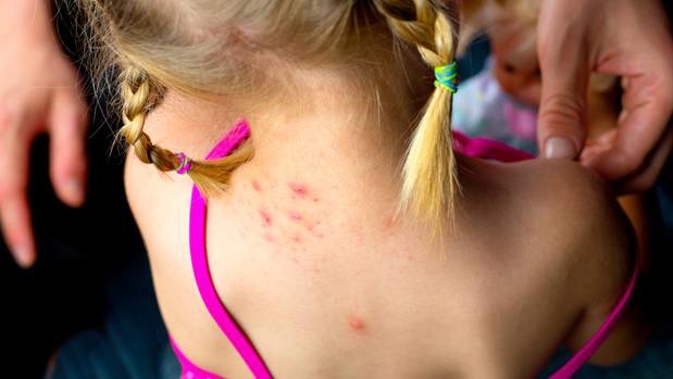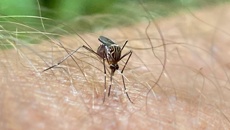
Half of South Auckland children sent for specialist care for serious skin conditions are declined an appointment, a Herald investigation has found.
The picture is similar at some other district health boards (DHBs), as the public system struggles with specialist-to-population ratios called "third world" by the NZ Dermatological Society.
Health Minister David Clark has now asked for advice on the problem.
In Canterbury, hundreds of referrals (mostly for adults) have been sent back, despite meeting the usual clinical threshold for an appointment.
In a letter back to GPs in some of those cases, David Smyth, the DHB's chief of medicine, explains "there is no capacity".
"Patients with funds could be encouraged to seek a private dermatology appointment, but we realise this is not possible for many," the letter states.
Counties Manukau DHB also turns down hundreds of referrals a year because of a lack of capacity - something its clinical head says has "significant risk" for patients.
Across town, the Auckland DHB declines fewer than one-in-10 patients, as do health boards including Wellington's Capital & Coast.
However, Counties Manukau, Waikato, Waitemata and Canterbury have return rates near or above 50 per cent, Official Information Act responses show.
From January to the end of June, 132 of 258 children referred to Counties' dermatology department were declined a first appointment (51 per cent).
For those aged 15 years and older, the decline rate was 42 per cent (679 of 1622).
The DHB didn't provide a break-down of conditions, saying it would take too long to compile. The numbers include referrals declined because the condition didn't meet clinical thresholds for an appointment.
/arc-anglerfish-syd-prod-nzme.s3.amazonaws.com/public/65YFJNNLFVCKXCEXURWXOLRH4Y.jpg)
Dermatologists see thousands of skin diseases, including eczema, psoriasis and cancer. They also play a crucial role in hospital rounds, including when patients react badly to medication.
Children sent for specialist care often suffer severe eczema, with poverty and overcrowded housing making them vulnerable to secondary infections.
Dr Paul Jarrett, the clinical head of dermatology at Counties Manukau, outlined the situation in a briefing to Clark in March.
South Auckland's dermatologist-to-population ratio was about 1:215,000, Jarrett noted, compared with the international norm of around 1:100,000.
"CMDHB dermatology rejects hundreds of referrals each year due to inadequate resourcing. This is a significant risk for the patient," Jarrett wrote in the briefing, released under the Official Information Act.
"The only way to prevent a waiting list breach and a subsequent [Ministry of Health] fine is to limit access to the service."
Jarrett is also president of the Dermatological Society, and spoke to the Herald in that role. He has met Clark and ministry officials to push for a better public service.
Asked about the regional differences in decline rates, Jarrett said it was a complex issue, but came down to demand for a service and the resources to match.
"Colleagues may not refer when there is a very limited service, so the actual need based on declines would be inaccurate."
Detailed advice was often still provided to a GP after the viewing of photos, even if the referral was declined.
"However, technology cannot do away with the need for face-to-face consultations," Jarrett said.
"There's been a lack of long-term strategic investment in publicly funded dermatology for many years. New Zealand needs to train more dermatologists and we also need to provide more public positions for them to fill."
That situation wasn't confined to dermatology: "I know that the DHBs are under financial stress in many areas."
Jarrett said there was a great deal of support from colleagues and senior management to expand the service at Counties if more funding becomes available, but "major challenges are to be expected when funding and budgets are not adequate".
In releasing the figures, the DHB said all referrals were reviewed according to national guidelines, and could be declined for a variety of reasons with advice often returned to GPs.
A new specialist dermatology/infectious disease clinical nurse position had been established, to link services and the community.
"Unhealthy living conditions are always associated with disease. And you can add skin disease to that," Jarrett said.
The Canterbury DHB is seeking urgent appointments after recent resignations and maternity leave.
In the year to July, 409 referrals that meet the clinical threshold were declined because there was no capacity.
Of those, 262 still received written advice and the remainder were sent Smyth's letter, which told GPs how to get help if their patient deteriorated. Virtual treatment advice was given where possible.
Clark said he took Jarrett's concerns seriously, and had asked the ministry for yet-to-be-received advice on addressing specialist workforce shortages.
'People have no idea how bad it can be'
Otara GP Dr Mark Arbuckle doesn't refer patients to dermatology unless absolutely necessary, "because you know it's probably going to be bounced back".
Late last year he asked for help for rest-home residents suffering recurrent scabies. A letter came back with treatment advice.
"It was very frustrating, because I did think they needed specialist review. We weren't getting anywhere. They obviously couldn't see them because they just didn't have the resources."
Delays and declined referrals were a problem in other specialty areas, Arbuckle said. Most patients at Otara Family and Christian Health Centre can't afford private healthcare.
Skin conditions in children often centre around bad cases of eczema and dermatitis. Open, itchy wounds lead to secondary infections, particularly in overcrowded living conditions.
/arc-anglerfish-syd-prod-nzme.s3.amazonaws.com/public/I56TNHV7BVEZHNU2WM4HNE2QLE.jpg)
Dr Nikki Turner is a Wellington GP and health spokeswoman for the Child Poverty Action Group, and said bad skin problems could also be hard to treat if a family had insecure housing and moved a lot.
The secondary infections on top of severe eczema were "just horrendous", said Turner, an associate professor at the University of Auckland.
"People have no idea how bad they can be.
"I just saw a family of nine ... half the children have really severe eczema. They got a skin infection that went around the entire family. And they were just weeping, open sores. And it's a good family, a family trying very hard. And yet it's overwhelming."
Overcrowding puts more pressure on services and perversely means DHBs could miss out on funding. Counties Manukau encouraged patients to complete this year's Census, but found many were reluctant to disclose there were more people in their house than tenancy agreements allowed for.
Fair Care investigation
• The Herald is investigating whether all New Zealanders are getting good healthcare when they really need it.
• Our reports will uncover some of the worst problems in our health system and then look for solutions.
• We also want to hear about your experience and ideas. Tell us your story: [email protected]
Stories published so far include:
• Breast cancer patients are battling for access to life-prolonging drugs.
• A young girl lost sight while languishing on a waiting list, as the DHB involved warns pressure on services remains "very real and concerning".
Take your Radio, Podcasts and Music with you








